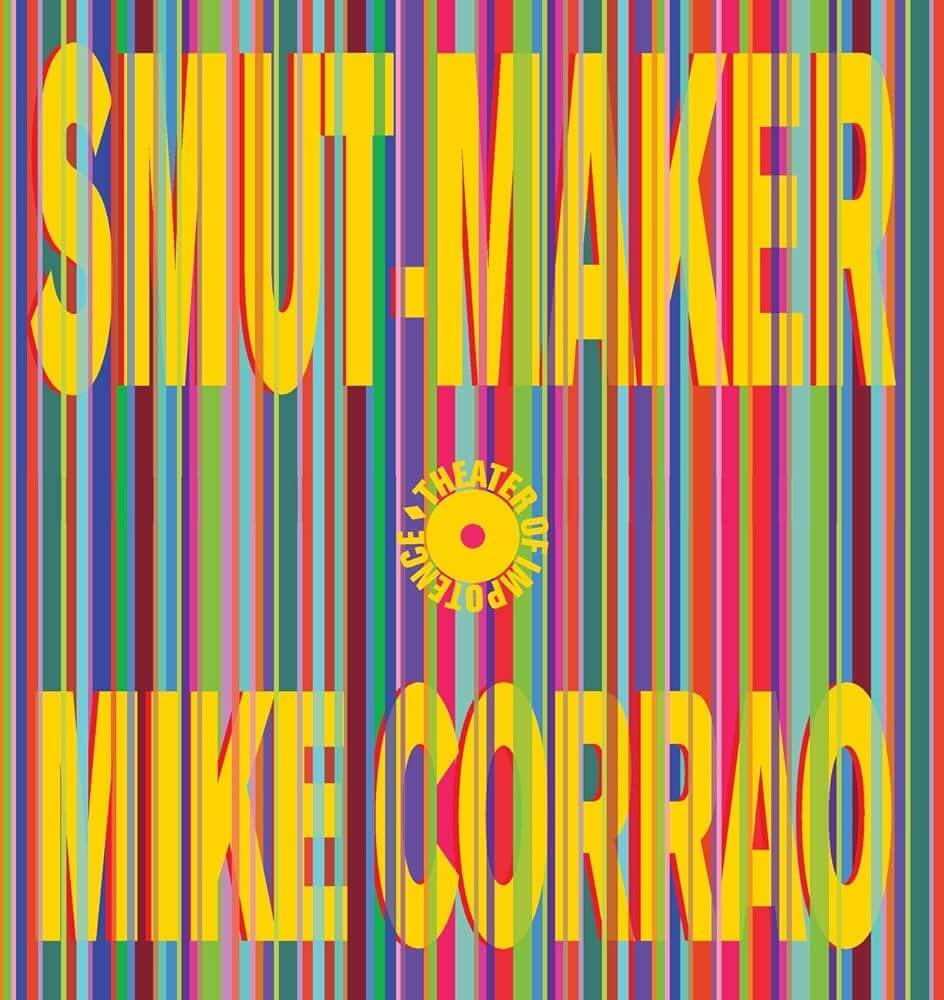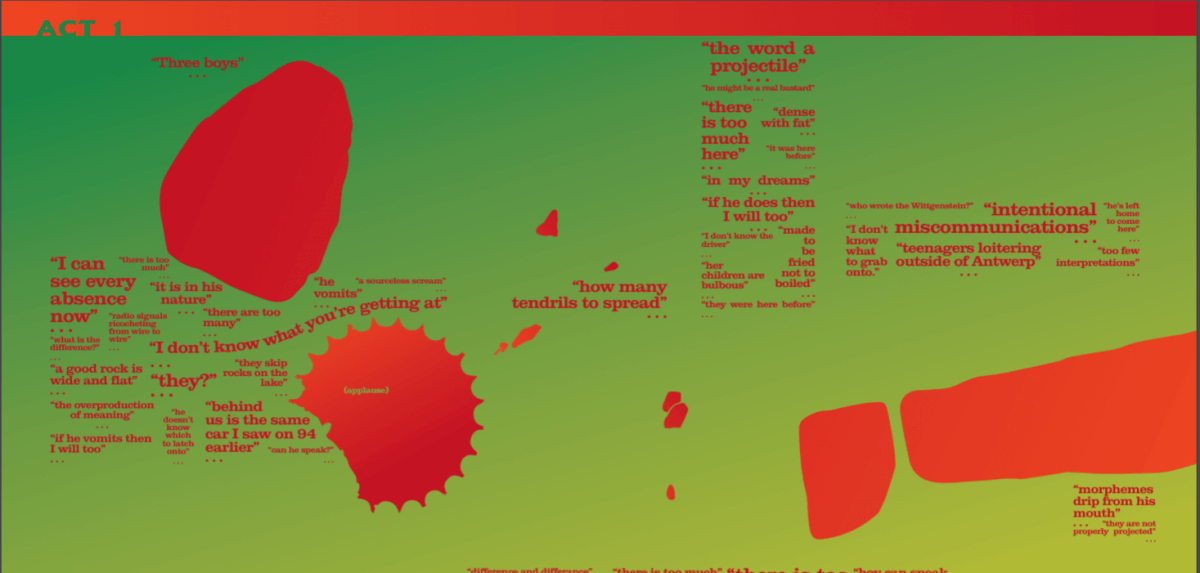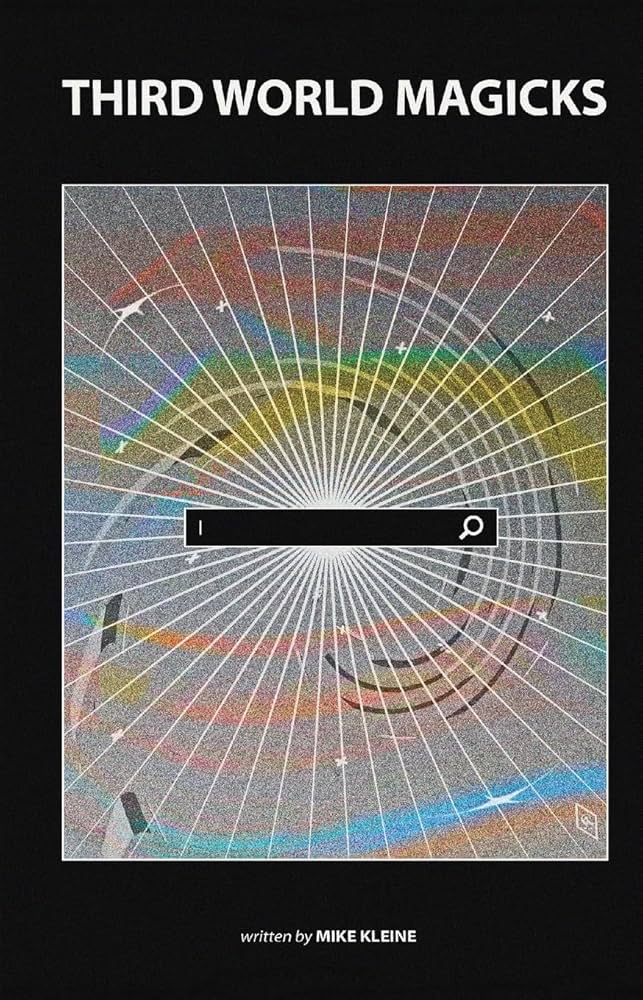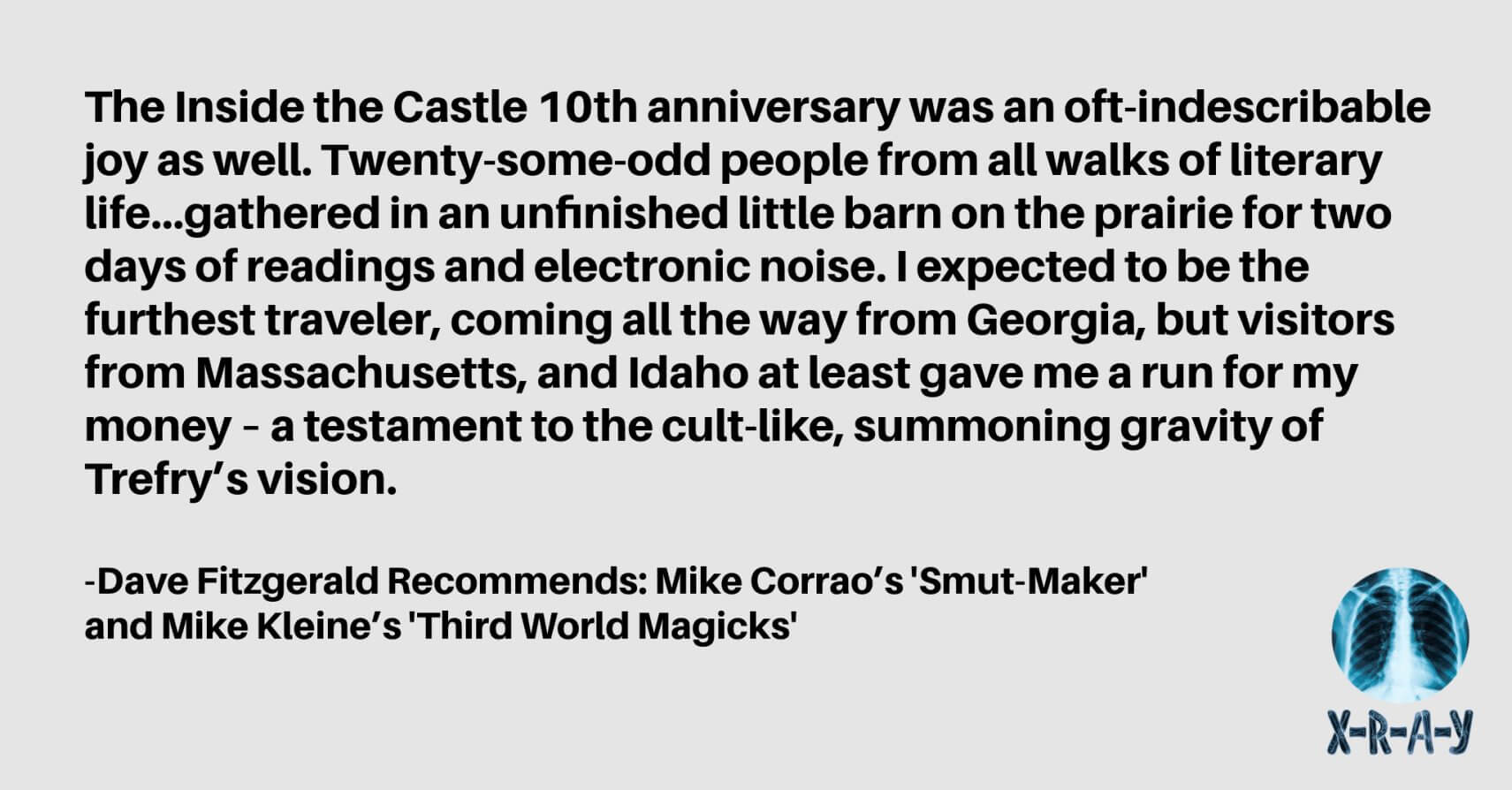I was cruising down I-70 aimed at Lawrence, Kansas when I got the email offering me a regular feature here at X-R-A-Y – part of a new “Recommends” series inviting me to draw on the deep backlog of reviews I’d already contributed to Goodreads, and pair them with new pieces exclusive to this site. Naturally I was flattered, and accepted right away from my fake-fancy hotel in the heart of the KU campus, already thinking about the pleasant symmetry of the timing. That is, I was in Kansas for the Inside the Castle 10th anniversary celebration, and as fate would have it, the inaugural title I’d attempted to write about back when I first started doing this some three years ago, was none other than Mike Corrao’s Smut-Maker from that very same small press. And as you’ll see from the next two paragraphs, which comprise that original review in its entirety, I do very much mean “attempted to.”
was cruising down I-70 aimed at Lawrence, Kansas when I got the email offering me a regular feature here at X-R-A-Y – part of a new “Recommends” series inviting me to draw on the deep backlog of reviews I’d already contributed to Goodreads, and pair them with new pieces exclusive to this site. Naturally I was flattered, and accepted right away from my fake-fancy hotel in the heart of the KU campus, already thinking about the pleasant symmetry of the timing. That is, I was in Kansas for the Inside the Castle 10th anniversary celebration, and as fate would have it, the inaugural title I’d attempted to write about back when I first started doing this some three years ago, was none other than Mike Corrao’s Smut-Maker from that very same small press. And as you’ll see from the next two paragraphs, which comprise that original review in its entirety, I do very much mean “attempted to.”
I can’t say with certainty that I read every single word of Smut-Maker, but it wasn’t for lack of trying. This is not a work that you absorb so much as one that you defeat. With text that squirms across the page in constantly shifting sizes, configurations, and directions, against power-clashing, technicolored background combinations that often seem chosen intentionally to make the eyes bleed, this psychotic, psychedelic drama demands you fight for every page turn. Though it bills itself as a play in 72 acts, and all of the dialogue is dutifully bracketed by quotation marks, it’s hard to imagine how it would be performed save by a group of maybe a half-dozen or so actors on a bare stage talking over each other all at once (just to be clear, I would absolutely go see this play). The best I can do for potential touchstones would be to liken it to the nauseating, spiraling, stream-of-altered-consciousness passages in Hubert Selby, tossed into a centrifuge with some of Mark Z. Danielewski’s wilder formalist notions – but even that description feels forced.

There are characters – I’m pretty sure – or at least references to names that could be characters. The titular Smut-Maker, for one, as well as a number of “Boys” who seem to be involved in various violent and/or sexual relations with one another. Wittgenstein, Bolaño, Sun Ra, detectives, and the author himself come in and out of focus as well. It’s pretty much impossible to parse, but parsing it’s not really the point. If you swim around in it long enough, little snippets of comedy and pathos, absurdity and wisdom, will start to bob to the surface around you, and by the time you’re done, you may well want to flip right back to the beginning and start again. For this is also a work you could read 100 times and still never read the same way twice – like a Choose Your Own Adventure through Hell, where no matter what page you keep your finger on, you’re never getting out alive.
I don’t mind telling you, I had no idea what I was getting into with this book. If memory serves, I bought it because it sounded sexy and it was on some kind of sale – but looking back now, I’m not sure I could have chosen a more perfect entrée into both the Inside the Castle oeuvre, or to my review practice in general. Smut-Maker was so emphatically different from any other book I’d read up to that point (that House of Leaves comp is downright mortifying to me now), that I might well mark it as a personal milestone – an indelible leap forward in my understanding of what books can do and be. Inside the Castle honcho John Trefry talks a lot about the importance of texts as physical objects, and as I reread Smut-Maker last week by the light of my office window, watching the garish ombré of each page ripple and morph between hues whenever the sun slipped in or out of a passing cloud, listening to my own brain chemistry crackle and fizz as it interacted with Corrao’s bubbling phraseological soup – “the rhizomatic labyrinth of mirrored buildings”; “subways looped into a Mobius strip”; “the world is not the same as it was a month ago”; “I’d rather just not know what I’m looking at” – I felt like I was finally starting to understand what that means.
Of course, Trefry and Corrao would both be quick to affirm what I surmised three years ago – that “understanding” is not the point of reading Smut-Maker, or most any of the now-50-strong corpus published under Inside the Castle’s black diamond sigil; that anyone who does the work of engaging with such “experimental” texts (a reductive catchall term they both find frustrating and tend to avoid) will inevitably end up reading and interpreting them differently, and that the very premise of “understanding” them is a wrongheaded approach (indeed, they both said as much during a roundtable discussion on Joe Bielecki’s indispensable indie lit podcast Writing the Rapids, which I listened to en route to the event). These books are decidedly not puzzles to be solved, but rather environments in which to play.
Also part of that illuminating episode was Inside the Castle regular Mike Kleine, who I had the pleasure of meeting in Lawrence, and whose short novel Third World Magicks acts as something of an ideal counterweight to Corrao’s psychochromatics. It’s easily the most straightforward narrative I’ve encountered among the now-ten Inside the Castle titles I’ve read, and yet every bit as much in tune with the press’s enigmatic ethos.
 Third World Magicks is what you might call deceptively simple. Kleine’s prose zips along with the matter-of-fact ratatat of technical writing or court reporting, whether he’s describing the work lives of indie music journalists in part one, or island-dwelling construction cultists in part two (these two parts are, somewhat mysteriously, separated by an author-mandated two-week waiting period). Without giving too much away – and truly, much of the pleasure of reading Third World Magicks is derived from its inveigling sense of mystery – I think it’s fair to describe it as being about both the conversation, and the conflict between language and art, and the perhaps inherent impossibility of expressing either one via the other. It evokes nothing quite so much as that old, unsourceable quotation – “writing about music is like dancing about architecture” – stretching that adage to its outermost shores from one end, before stranding it atop its innermost promontory at the other.
Third World Magicks is what you might call deceptively simple. Kleine’s prose zips along with the matter-of-fact ratatat of technical writing or court reporting, whether he’s describing the work lives of indie music journalists in part one, or island-dwelling construction cultists in part two (these two parts are, somewhat mysteriously, separated by an author-mandated two-week waiting period). Without giving too much away – and truly, much of the pleasure of reading Third World Magicks is derived from its inveigling sense of mystery – I think it’s fair to describe it as being about both the conversation, and the conflict between language and art, and the perhaps inherent impossibility of expressing either one via the other. It evokes nothing quite so much as that old, unsourceable quotation – “writing about music is like dancing about architecture” – stretching that adage to its outermost shores from one end, before stranding it atop its innermost promontory at the other.
Speaking as someone who put in a solid and committed three years as a music journalist for my local alt-weekly (shouts to Athens’ Flagpole Magazine), regularly attending two and three shows a week, transcribing dozens of staticky interviews conducted on my Motorola flip-phone, and reviewing countless albums for what worked out to, on average, about $25 a week plus cover charges and the occasional free drink, believe me when I say that Kleine’s depiction of the gig is hilariously well-realized. From working on “an exhaustive 100 songs of the decade list” and describing an artist’s live set as “truly something to experience before you die,” to the competitive name-dropping and the militant resistance to being impressed, or even surprised by new music for fear of being seen as not in the know, the trials and tribulations of blank zizou hit as hard as an Abul Mogard Farfisa drone, such that by the time she finds herself having a full-on, out-of-body, psychedelic experience, transcending time and space deep in the balm of that (phenomenal, look him up) artist’s “loud and enormous” sound, the idea of her translating her thoughts to paper feels completely absurd – an absurdity that is, necessarily, mirrored in Kleine’s own ekphrastic rendering of her mind’s ear.
It’s that interior disconnect that Third World Magicks gets at most effectively, with regards to both its music writers in part one, and the dedicated, communal followers of black magician in part two (I’ve made a conscious decision to say as little about part two as possible here – much like the white cube at its center, it’s not particularly useful to describe – but rest assured it is worth that two-week wait). I recalled strongly my own eventual burnout with music writing – the creeping dissatisfaction I felt as I tried to bridge that last sliver of impassable distance between the art made by others, and my own latent creative impulse; to close the gap between all our lonely, disparate consciousnesses and somehow express my true self. blank zizou goes so far as to imagine making her own impossible music whilst drifting spaghettified inside of Abul Mogard’s, but no matter how many shows you write about, it’s still not the same as being in the band. And no matter how much brilliant art you make, it’s still not the same as telling people exactly how you feel. I could sit here and write whole essays about similar experiences I’ve had, standing in a packed house for hours with my eyes closed while fiery pillars of Fennesz or cosmic waves of Sunn O))) swept me up into the great beyond. But until you hear it yourself, you won’t know. And even when you do, it won’t be the same. Not for you. Not for anyone.
I would estimate that for most people, each half of Third World Magicks could be read comfortably in under an hour, but fighting that impulse at the sentence level are a number of typographical tics (no capital letters, the use of ampersands in place of the letters “and” even when they appear within other words, a book-long commitment to vestigial k’s like the one in the titular Magicks) as well as a parade of ludicrous character names and a handful of science terms that, even upon looking them up, you may still not possess the tools to fully grasp (I certainly didn’t). With all these deliberately cryptic artistic choices pinging your brain like a cell tower, conspiring in their refusal to let you settle into complacency, the resultant sensation is akin to one of those NBA drills where a player attempts to get to his spots and get up his shots while two or three coaches throw extra basketballs at him without warning. Every time you think you’re in a rhythm with Third World Magicks, Kleine tosses a reverse footnote at your head or a sheet of pointillist punctuation at your ribs and makes you readjust on the fly. He keeps you moving, and it’s a joy to be moved.
The Inside the Castle 10th anniversary was an oft-indescribable joy as well. Twenty-some-odd people from all walks of literary life – writers, reviewers, teachers, translators, booksellers, avid fans, local friends, and a couple of very cute cats – gathered in an unfinished little barn on the prairie for two days of readings and electronic noise. I expected to be the furthest traveler, coming all the way from Georgia, but visitors from Massachusetts, and Idaho at least gave me a run for my money – a testament to the cult-like, summoning gravity of Trefry’s vision. The chiggers were fierce. The lightning was multipronged and cycloramic. The breakfast-for-dinner was better than anything I saw at my fake-fancy hotel. But more than that, everyone was simply lovely – kind, and open, and thrilled to be there meeting other weirdos like themselves – putting names to faces – bridging our gaps. I wouldn’t claim to “understand” everything I heard across that magical weekend – from the warpfield poetics of Candace Wuehle and Madison McCartha to the generative philosophical would-you-rathers of Kyle Booten to the bleeding edged linguistic produnovas of Grant Maierhofer and Trefry himself – but I felt honored and privileged to hear every bit of it, and to carry it home with me, and to now pass it along to you. Compared to my time in the music writing trenches, I definitely felt like I’d found some of that connection that evaded me during all those mind-blowing shows I’d covered alone. When enough writers get together to share in their work, you all start to feel like part of the band. Even criticism can elevate toward the realms of art.
Trefry himself is an ardent supporter of book reviewing as not only a service to the small press community, but as a vital part of any writing practice, as evidenced by quotes like “nothing has clarified my intentions and expectations about literature more,” “everyone should do it,” and my personal favorite, “if you’re writing a book review as though it’s not your work, you’re doing it wrong.” I’ve tried to approach my reviews with this level of care since that first, labored attempt to describe Mike Corrao’s Smut-Maker to the world, and Trefry and Kleine have likewise put their money where their mouths are with Third World Magicks, going so far as to include several reviews of the book at the end of the narrative proper, almost as a kind of ellipsis – a nod to the ongoing discourse in which Inside the Castle and its readers are mindfully participating. Take it from someone who knows. Indie rock is doing just fine. But indie lit still needs all the reviews it can get.
In wrapping up this edition of X-R-A-Y Recommends, allow me to paraphrase a popular conceit from my music writing days: these guys are your favorite writer’s favorite writers. Corrao, Kleine, and Trefry may never be bestsellers, but they’ve got cred coming out of their ears. They write pareidolic. They write klangfarbenmelodie. And I love their work for the same reasons I still seek out strange and unfamiliar music every day – for the pleasure of new words, new ideas, new ways of feeling and being surprised. As strange and beguiling as Inside the Castle texts can be, they are, in fact, for everyone. Enjoying them is not about being smart enough to figure them out, but rather finding curiosity and excitement in the incomplete spaces of your own unknowing; letting them live, and breathe, and work on you, quite possibly for the rest of your life; coming back to them again and again, with the understanding that they’re no more static than you are; that they’ll change right along with you, and the chemicals in your brain, and the light outside your window; that no matter how many times you read them, they’ll still be different every time.

